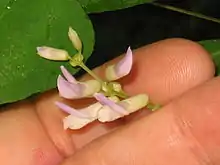Amphicarpaea
Amphicarpaea, commonly known as hogpeanut,[1] is a genus of flowering plants in the legume family, Fabaceae. It belongs to the subfamily Faboideae.
| Amphicarpaea | |
|---|---|
 | |
| Amphicarpaea bracteata | |
| Scientific classification | |
| Kingdom: | Plantae |
| Clade: | Tracheophytes |
| Clade: | Angiosperms |
| Clade: | Eudicots |
| Clade: | Rosids |
| Order: | Fabales |
| Family: | Fabaceae |
| Subfamily: | Faboideae |
| Tribe: | Phaseoleae |
| Subtribe: | Glycininae |
| Genus: | Amphicarpaea Elliott ex Nutt. |
| Species | |
|
See text. | |
| Synonyms | |
| |
Species include:
- A. bracteata – eastern North America[2]
- A. edgeworthii Benth. – eastern and southeast Asia (China, India, Japan, Korea, Russia, Vietnam)[3][4]
It is classified in subtribe Glycininae and its closest relatives are Glycine and Teramnus:[5]
|
Amphicarpaea | |||||||
|
| |||||||
References
- English Names for Korean Native Plants (PDF), Pocheon: Korea National Arboretum, 2015, p. 350, ISBN 978-89-97450-98-5, archived from the original (PDF) on 25 May 2017, retrieved 25 January 2016 – via Korea Forest Service
- "Amphicarpaea", Natural Resources Conservation Service PLANTS Database. USDA
- Sachiko Funayama, Ichiro Terashima and Tetsukazu Yahara (2001), "Effects of virus infection and light environment on population dynamics of Eupatorium makinoi (Asteraceae)", American Journal of Botany, 88 (4): 616–622, doi:10.2307/2657060, JSTOR 2657060, PMID 11302846
- Sa, Ren; Gilbert, Michael G., "Amphicarpaea edgeworthii", Flora of China, 10 – via eFloras.org, Missouri Botanical Garden, St. Louis, MO & Harvard University Herbaria, Cambridge, MA
- Jeongran Lee and Theodore Hymowitz (2001), "A molecular phylogenetic study of the subtribe Glycininae (Leguminosae) derived from the chloroplast DNA rps16 intron sequences", American Journal of Botany, 88 (11): 2064–2073, doi:10.2307/3558432, JSTOR 3558432
| Wikispecies has information related to Amphicarpaea. |
| Wikimedia Commons has media related to Amphicarpaea. |
This article is issued from Wikipedia. The text is licensed under Creative Commons - Attribution - Sharealike. Additional terms may apply for the media files.